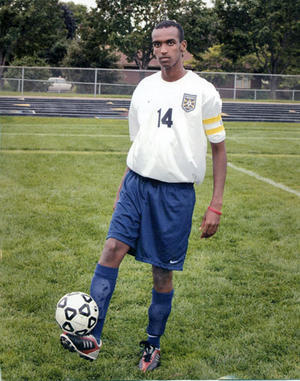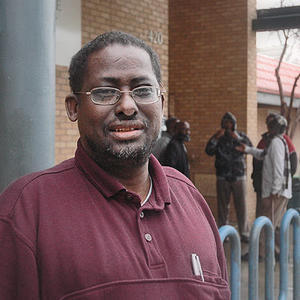fiogf49gjkf0d
Continued from page 4...

By Erin Carlyle
Tuesday, November 11, 2008
 |
| Augsburg College student Ahmednur Ali aspired to become president of Somalia one day, but instead his life was cut short. He was murdered after volunteering at Brian Coyle Community Center. |
Compounding the problem is the widespread perception among Somalis that the police aren't doing enough to protect their community. Until they feel safe, many say, they won't come forward with what they know.
ut in recent months, some brave Somalis have begun to testify. Perhaps because the murder of the Augsburg College student was so shocking, witnesses came forward almost immediately. Police arrested Ramadan Abdi Sheikhosman, a 16-year-old wannabe gangster. Three other witnesses helped police identify Hassan Mohamed Abdillahi as the suspect in the most recent killing—based on his physical build and manner of walking, they I.D.ed him from a security camera videotape.
"I would like to say that we like peace," says Ahmed Warsame, a leader of the Somali elders. "We like to bring peace and live peace. That's why we left our country."
IT RAINED on the morning of September 23, the day of Ahmednur Ali's funeral. It was raining still as Ahmednur's father, brothers, and their male friends filed into a Columbia Heights mosque for the khalasa, the washing of the corpse for burial. As the body was brought into the room, the rain stopped. The men poured clear water over Ahmednur's cloth-draped form. They gently wrapped him in a clean, white kafan, the burial cloth. Then the rest of his family came in to say goodbye.
It was raining again when the men placed Ahmednur's body inside the coffin for the janazah, the special prayer for forgiveness of the dead. About 1,000 people prayed that day, some outside the mosque because it was so packed. The heavy rain continued as the cars processed to Burnsville for the burial, making the road slick and delaying the man who brought the body.
 |
| Saeed Osman Fahia, the unofficial historian of Somalis in Minnesota, understands the social factors that have led to violence among Somali youth |
When the cars reached the burial site, the rain stopped. The sun came out from behind its curtain of clouds and shone on the mourners. The family took the heavy rain, and its strangely timed absences, as a sign of God's mercy.
"The night he got killed was the 23rd night of Ramadan," said a younger sister.
"Odd nights are better than even nights."
"Last 10 days of Ramadan, another good sign," said his mother, Asha. "He was fasting, too, that's a good sign."
After the men completed the burial, the women of the family approached the grave.
Asha stood there for half an hour, as the other family members stepped away. Islam teaches that the last one to leave the burial site is the person whom the spirit of the deceased remembers. Asha wanted to be the one her son remembered.